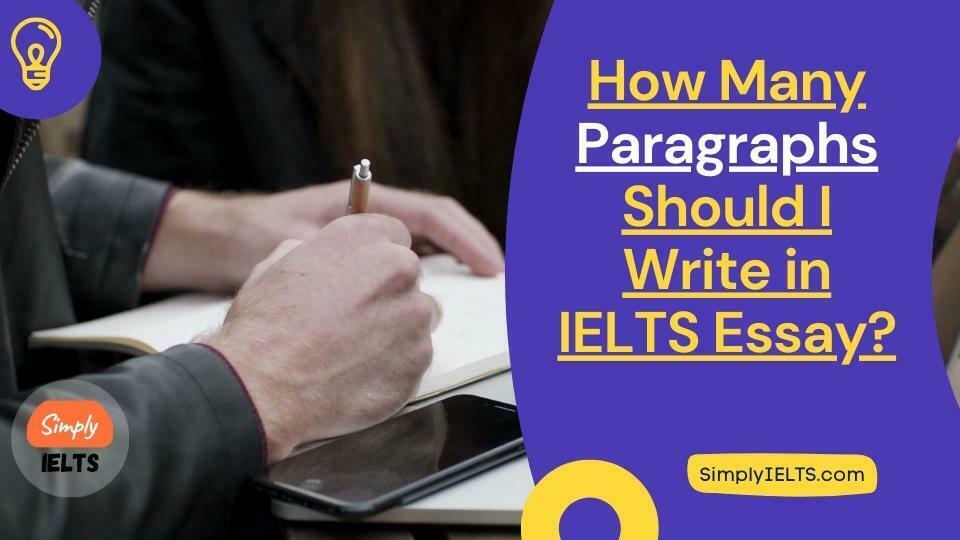How Many Paragraphs Should I Write in IELTS Essay or Writing Task 2?

When I was teaching IELTS students how to decode the IELTS Writing Task 2, a small hand shot up the other day.
The student asked, “how many paragraphs should I write in IELTS essay?” Considering the minimum word limit is 250, students often want to know what their essay should look like. I never realised that the answer is not as evident as I had initially thought!
You should write four paragraphs in your IELTS Essay. There should be an introductory paragraph, two body paragraphs, and an end paragraph.
The introduction paragraph tells the reader about the topic of the essay. Moreover, usually, IELTS essay has two subtopics, which must be written in different paragraphs. Further, the last paragraph summaries the whole essay.
To understand the topic better, let us assess the following IELTS essay task.
You should spend about 40 minutes on the task.
Nowadays, more and more older people who are looking for work have to compete with younger people for the same jobs.
What problems does this cause?
What are some possible solutions?
Give reasons for your answer and include any relevant examples from your own experience or knowledge.
Write at least 250 words.
Let’s analyse how many paragraphs you must write.
Introduction paragraph
Introduction paragraph declares according to you what is the overall topic about. Also, it must explain which aspects of the essay you are going to discuss. And, lastly, if you are asked to express your opinion, you must do so here itself.
Identify the boundaries or the sub-topics to write two body paragraphs.
Now, if you analyse the given task, it is clear that the main topic is about older people competing with younger employees for the same job.
However, if one considers only this much, you may write about many sides. You could write about
- How can youngsters update themselves to compete?
- Should seniors even race against the younger lot of employees?
- What can older people do to keep themselves updated?
- What problems may this trend have in the future?
- What could be the solutions to avoid this situation?
Now, read the instruction immediately below the topic. It is as follows
What problems does this cause?
What are some possible solutions?
You may realise that you are not supposed to discuss all of the sub-topics but only the last two: problems and solutions.
It is clear that these two questions or sub-topics restrict the essay topic and so I like to call them boundaries. Once the boundaries or subtopics are established, the student can write one paragraph for each boundary, so that different ideas are neatly separated for the examiner.
This gives a logical ‘flow’ to your essay, making it easier for the examiner to understand your argument. This will also boost your Cohesion and Coherence marks as the essay is appropriately structured.
The END paragraph
In the END paragraph, summarise the main arguments or ideas of your essay. Having an end paragraph ensures that your essay does not feel abandoned, as if someone could not finish writing the whole essay. It tells the examiner that you don’t have any more arguments to make.
Even if one does not read the body paragraph, the reader should be able to understand your view by simply reading your introduction and end paragraph.
Summary
Four paragraphs are most appropriate to distribute all the points in the IELTS Essay. The Introduction would tell the readers about the topic and the writer’s stance.
The two body paragraphs explain why the writer has that stance, and the end paragraph summarises the whole essay in just a few words.
You might want to calculate how many words you can spare for each paragraph before you sit for the exam, or you can click here to see what we recommend.





Responses